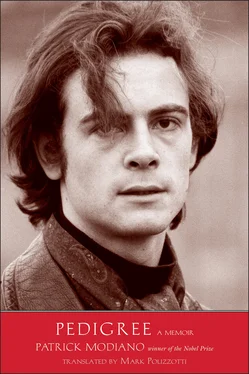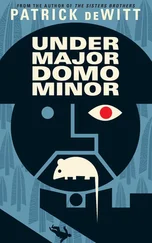At the Gare d’Austerlitz, my father and I caught the train to Bordeaux. I had no luggage, as if I were being kidnapped. I’d agreed to leave with him in hopes of talking things over between us: it was the first time in two years we’d been alone together, other than those furtive meetings in cafés.
We arrived in Bordeaux that evening. My father took a room for the two of us at the Hôtel Splendide. The following days, we went to the shops on Rue Sainte-Catherine to buy my necessities for the school year — of which the Lycée Michel-Montaigne had sent my father a list. I tried to convince him that all this was pointless, but he stuck to his guns.
One evening, in front of the Grand Théâtre, I started running to try to lose him. And then I felt sorry for him. Again I tried to talk things over. Why was he always so eager to get rid of me? Wouldn’t it be simpler if I just stayed in Paris? I was too old to be shut up in boarding schools … He didn’t want to hear it. So then I pretended to give in. As before, we went to the movies … The Sunday evening before school began, he brought me to the Lycée Michel-Montaigne in a taxi. He gave me 150 francs and made me sign a receipt. Why? He waited in the taxi until I had disappeared through the front door of the school. I went up to the dormitory with my suitcase. The boarders treated me as a “new kid” and forced me to read aloud a text in Greek. So I decided to run away. I left the school with my suitcase and went to have dinner at the restaurant Dubern, on Allée de Tourny, where my father had taken me on the previous days. Then I took a cab to the Gare Saint-Jean. And a night train to Paris. There was nothing left of the 150 francs. I was sorry not to have seen more of Bordeaux, the city of The Unknown Sea; not to have breathed in the scent of pines and their resin. The next day, in Paris, I ran into my father on the stairs in our building. He was stunned to see me. We would not speak to each other for a long time after that.
And the days and months passed. And the seasons. Sometimes I’d like to go back in time and relive those years better than I lived them then. But how?
I now took Rue Championnet at the hour of the afternoon when the sun is in your eyes. I spent my days in Montmartre in a kind of waking dream. I felt better there than anywhere else. The metro stop Lamarck-Caulaincourt, with its rising elevator and the San Cristobal midway up the steps. The café at the Terrass Hôtel. For brief moments, I was happy. Get-togethers at 7 P.M. at the Rêve. The icy handrail on Rue Berthe. And me, always short of breath.
On Thursday, April 8, 1965, judging from an old diary, my mother and I didn’t have a cent. She forced me to go ring at my father’s door and demand some money. I climbed the stairs with a leaden heart. I’d intended not to ring, but my mother was glaring up at me from the landing, eyes and chin tragic, foaming at the mouth. I rang. He slammed the door in my face. I rang again. The ersatz Mylène Demongeot screamed that she was going to call the police. I went back down to the third floor. The police came for me. My father was with them. They made both of us climb into the Black Maria parked in front of the building, under the dumbfounded eyes of the concierge. We sat on the bench, side by side. He didn’t say a word to me. This was the first time in my life I found myself in a police van, and as it happened, it was with my father. He had already been through this before, in February 1942 and in the winter of 1943, when he’d been picked up by the French inspectors of the Jewish Affairs police.
The Black Maria followed Rue des Saints-Pères, then Boulevard Saint-Germain. It stopped at a red light in front of the Deux Magots. We arrived at the police station on Rue de l’Abbaye. My father pressed charges with the superintendent. He called me a “hooligan” and said I’d come up to his place to “make trouble.” The superintendent declared that the “next time” he’d keep me there. I could tell my father would have been perfectly content to leave me at that police station once and for all. We returned together to the Quai de Conti. I asked why he’d let the ersatz Mylène Demongeot call the police and why he’d pressed charges. He said nothing.
That same year, 1965—or perhaps 1964—my father demolished the inner staircase connecting the two floors, and the apartments were separated for good. When I opened the door and stood in the small room filled with rubble, I found some of our childhood books, along with postcards addressed to my brother that had remained on the fourth floor, there among the debris, torn in pieces. May and June. Still in Montmartre. It was nice out. I was at a café on Rue des Abbesses, in the springtime.
July. Night train, standing in the corridor. Vienna. I spend a few nights in a seedy hotel near the Westbahnhof. Then I hole up in a room behind the Karlskirche. I meet all sorts of people at the Café Hawelka. One evening, I celebrate my twentieth birthday with them.
We sunbathed in the gardens of Potzleinsdorf, and also in a little shack in a working-class allotment near Heiligenstadt. The Café Rabe, a gloomy beer hall near the Graben, was always empty and you could listen to songs by Piaf. And still that slight giddiness mixed with lethargy, in the summer streets, as if after a sleepless night.
Sometimes we went up to the Czech and Hungarian borders. A large field. Watchtowers. If you walked in the field, they would fire at you.
I left Vienna at the beginning of September. Sag’ beim Abschied leise “Servus,” as the song goes. A passage by our Joseph Roth calls to mind the city I haven’t seen in forty years. Will I ever see it again? “You had to grab these shy, fleeting evenings before they disappeared, and what I liked best was to catch them in the parks, the Volksgarten or the Prater, and then to savor the last sweetest lingering of them in a café, where they seeped in, gentle and mild, like a fragrance …”
Night train in second class, at the Westbahnhof, Vienna to Geneva. I arrived in Geneva at the end of the afternoon. I caught the bus for Annecy. In Annecy, night had fallen. It was pouring. I was broke. I went into the Hôtel d’Angleterre on Rue Royale, with no idea how I’d pay for a room. I no longer recognized Annecy, which that evening was a ghost town in the rain. They had demolished the old hotel and derelict buildings near the station. The next day, I ran across some friends. Many had already left for military service. That evening, I thought I saw them pass by in the rain in uniform. As it turned out, I had fifty francs left. But the Hôtel d’Angleterre was expensive. During those few days, I had gone to the Collège Saint-Joseph in Thônes to visit my old literature teacher, Father Accambray. I had written him from Vienna, asking whether they might hire me as a proctor or assistant teacher for the coming year. I think I was trying to avoid Paris and my poor parents, who had given me no moral support whatsoever and had left me with my back to the wall. I’ve found two letters from Father Accambray: “I’d love it if the school year could start with you as a teacher in our house. I’ve spoken with the Superior. The teaching staff is full, but there could possibly be some movement before the end of August, which I hope will happen so that you can join us.” In the second, dated September 7, 1965, he writes: “The teaching schedule on which I’ve been working these past few days clearly shows, alas, that we have more than enough staff for the 1965–66 school year. We simply can’t offer you any work, even part-time …”
But life continued with no clear sense of why at a given moment you found yourself with certain individuals rather than others, in certain places rather than others, and whether the film was in the original language or dubbed. These days, all that remain in my memory are brief sequences. I enrolled in the Faculty of Literature to prolong my military deferment. I never went to classes and was a phantom student. Jean Normand (alias Jean Duval) came to live at Quai de Conti for several months, in the small room that had once contained the inner staircase connecting the third and fourth floors. He worked in a real estate office but was persona non grata in Paris. That’s something I would learn later. My mother had met him around 1955. Normand was twenty-seven then and had just served time in prison for burglary. As it happened, he had committed some of those burglaries, while still very young, with Suzanne Bouquerau, the woman my brother and I lived with in Jouy-en-Josas. He must have gone back to jail since then, as he was in Poissy prison in 1959. He made some basic restorations to the dilapidated room and I’m sure he gave my mother money. I was very fond of this Normand (alias Duval). One evening, he quietly left a hundred-franc bill on the mantelpiece of my room, which I discovered only after he’d gone. He drove a Jaguar, and the following year, at the time of the Ben Barka Affair, I read in the papers that they’d nicknamed him “the tall man with the Jaguar.”
Читать дальше












